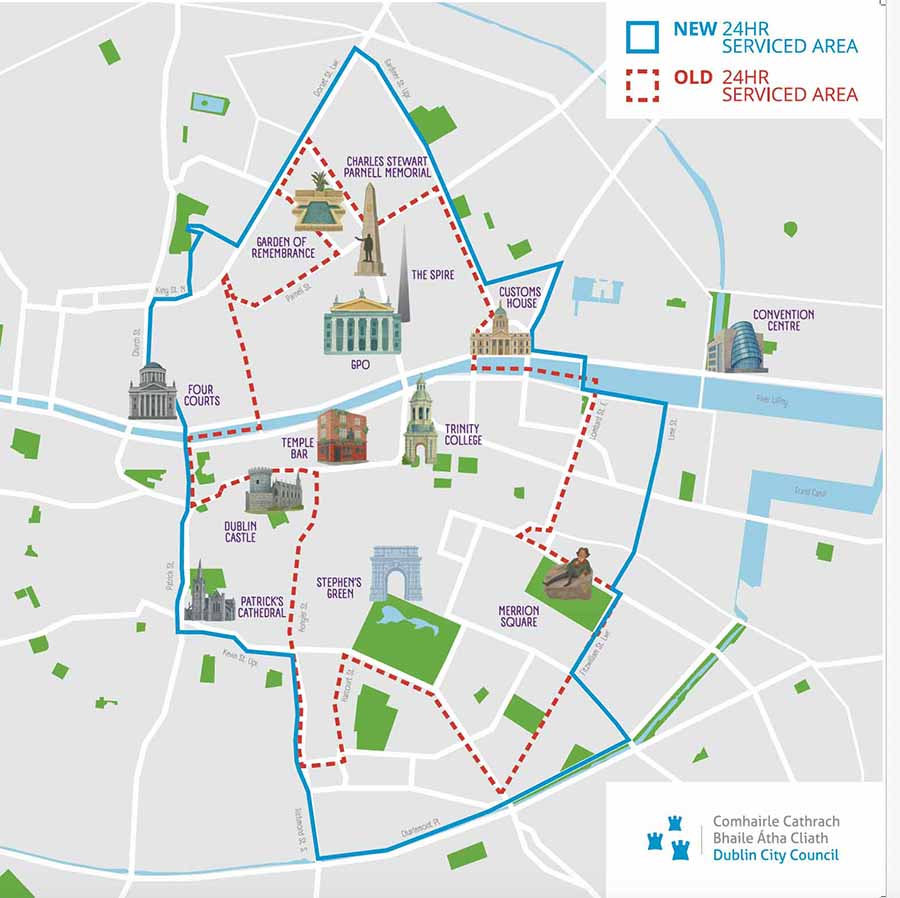
Dublin City Council has launched a three-pillar Waste Management Strategy to improve city cleanliness and sustainability, employing 100 additional waste management staff and upgrading equipment.
The strategy includes expanding 24-hour cleaning zones and better litter enforcement, alongside the introduction of a Litter Prevention and Awareness Campaign called ‘Bin It’.
New vehicles will enhance waste management capabilities, including the introduction of electric vehicles and specialized washing equipment for city streets. The council aims to remove plastic bag waste collection from 90 streets, transitioning to reusable waste receptacles by January 2025.
As a part of this strategy the Council has:
- Recruited 100 extra waste management staff
- Invested in new vehicles to tackle litter
- Expanded the 24-hour cleaning zones
- Removed the ability to present waste in plastic bags from 90 streets
- Facilitated installation of waste compacters in two city-centre locations to support the removal of the plastic bags
- Increased the street washing capability with a dedicated night-time street washing team, and a specialised wash vehicle per area and a city-wide rapid response team
- Appointed six new litter wardens including a night patrol service to step up enforcement
- Introduced a Litter Prevention and Awareness Campaign
Lord MayorRay McAdam shared “This is about showing the scale of what’s being done and asking everyone to join in. Dublin now has one of the highest densities of public bins in Europe. Every day, Dublin City Council’s waste management crews are out before dawn with 500 people working 24/7 to clean the city, collecting tonnes of litter from 3,500 bins, responding to more than 700 service requests a week, from illegal dumping to urgent clean-ups and collect approximately 18,000 tonnes of waste annually. “
Dublin belongs to all of us. Our cleaning teams work tirelessly every single day, but no city can stay spotless unless everyone takes responsibility. Today is about showing the scale of what’s being done and asking everyone to join in. The Council has expanded its resources and equipment to do more than ever before, but keeping Dublin clean is a shared responsibility, and we all need to play our part.”
The full statement:
Dublin City Council is at the heart of everything that happens in the city. We have a long and proud tradition of serving the public and leading the direction, growth and development of the City. The City Council comprises 63 elected members. In partnership with the Elected Members, and partner agencies and organisations in the City, the Council team of 5,900 staff deliver over 520 different services to Dublin’s citizens, businesses and visitors.
Dublin City Council’s 3 Pillar Waste Management Strategy
Pillar 1 looks at Operational Enhancements, Pillar 2 examines Enforcement and Regulation Change, while Pillar 3 deals with a Litter Awareness and Prevention Advertising Campaign.
Pillar 1
Employ an additional 100 operational staff, which will increase the workforce to 540
Under the first phase of the recruitment process, 32 of the 100 new staff began work in July. They have all been assigned to the city-centre. This will increase staff numbers on each of the 3 crews operating in the city-centre from 38 to 50 and will mean that there will then be 150 staff covering shifts 6am to 9pm 7 days a week
Once all new staff are familiar with service requirements, we will then expand the footprint of the city-centre area that receives this 24 hour cleaning service. We expect this expansion to take place within the next 10-12 weeks
The next phase of the recruitment process will begin in the coming weeks and extend into Q4 of this year. Some of the staff recruited in this phase will be assigned to bolster resources in our city-wide wash crews while others will join a new city-wide rapid response team. This new team will be responsible for reacting to enquiries about issues such as road/pavement maintenance, illegal dumping, litter bin washing etc
The final phase of recruitment will take place in Q1 2025. This will provide extra staff resources to work in suburban areas from 2pm to 10pm
To complement the increase in staff resources, we are also undertaking a €8.5m enhancement and upgrade of the waste management fleet. This includes 22 new compact sweeper vehicles, new wash vans, 5 new heavy goods vehicles, the replacement of 60 of our side loader fleet (50pc of which will be electric), 27 new hand vac mechanical sweepers and new cycle lane sweepers.
Pillar 2
Employ additional litter wardens to improve our enforcement capabilities, with a particular focus on takeaways and licensed premises
In 2016, approximately 1,000 streets were designated as ‘Bag Collections Areas’. The properties on these streets were given a derogation on having to use a reusable receptacle such as a wheelie bin and were instead allowed present their waste in plastic bags. We have begun a review of this arrangement and intend to commence a process to remove this derogation on as many streets as possible. From 16th September 2024 a transition period will begin for owners/occupiers of retail, commercial and residential buildings in the designated Phase 1 area, who will not be allowed present waste in plastic bags on city streets for collection. Full compliance is expected by 1st January 2025. There are 90 streets covered in this phase including, but not limited to, Aungier St, Baggot St Lower, Chatham St, College Green, Dame St, Exchequer St, Fleet St, Grafton St, Kildare St, Molesworth St, Nassau St, Parliament St, St Stephens Green, Temple Bar
All businesses and households in the Central Commercial District area are permitted to present waste for collection 7 days a week. Waste can be presented after 5pm each day and must be removed from the kerbside by 10am the following day. We feel this window for collection should be reduced and we intend to commence a process to bring about this change
Pillar 3
Deliver a litter awareness and prevention campaign to bring about a change in culture and public behaviour. Delivering this change is perhaps the biggest challenge we face. The campaign will focus on education along with warnings on enforcement
As an extension of the campaign, we are also keen to explore all opportunities to prevent littering. One way of doing this is to reduce the presentation of waste in plastic bags for collection. Another trial in the pipeline is a ‘Shared Bins BETA trial’, looking at the potential of a communal storage area in a residential setting.
We are also looking at other products for customers to use which can replace or protect plastic bags on the kerbside, including the reusable caddie and ‘Bagbin’ project.




